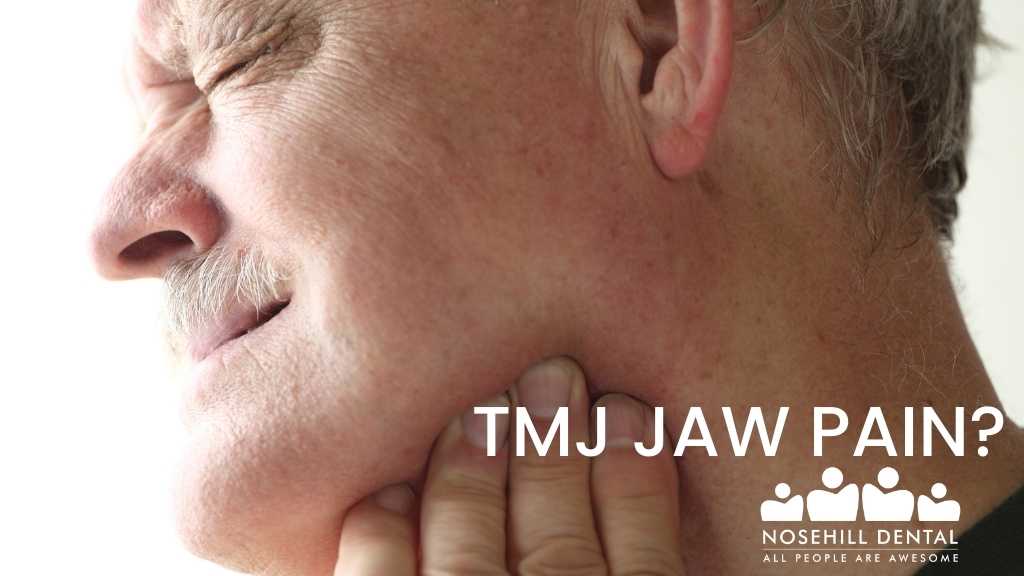
If you’re experiencing jaw pain, you may be wondering what the problem is and whether it’s serious. Unfortunately, jaw pain can come from many different sources, but one of the most common is temporomandibular joint disorder (TMJ). This problem affects your jaw muscles and your ability to open and close your mouth normally. Fortunately, TMJ can be treated with medication and physical therapy in order to help you get back to healthy eating and smiling again.
Our dentists at Nosehill Dental - TMJ Dentist Calgary NW - can treat TMJ pain effectively. Please visit our website at www.nosehilldental.com.
Temporomandibular joint disorder (TMJD) is a health condition can cause pain in your jaw. Technically, it’s not one specific disorder—TMJD refers to many different conditions with similar symptoms. The word temporomandibular comes from temporo-mandibular, which means jaw and chewing muscles. The temporomandibular joints are located near your ears and they connect your lower jawbone to your skull; when they function properly, they allow you to open and close your mouth, as well as chew food.
Problems occur when these joints become inflamed or damaged due to injury or disease. Some of these disorders include: arthritis, osteoarthritis, osteonecrosis (loss of blood supply), loose teeth, misalignment of teeth and facial injuries such as fractures or dislocations. TMD has been linked to other health problems such as migraines, neck pain, sinus pain, ear pain, eye pain, depression and anxiety disorders. If you experience any pain or discomfort in your jaw that interferes with your daily life activities like eating or talking then talk to your doctor about what steps you should take next. Our (Nosehill Dental) recommendation: Schedule a TMJ Diagnosis Appointment.
Most of the time, TMJ pain is linked to a past injury. The past injury may be due to an accident, a fall, an injury to the upper body, facial injury, or from some past dental work like an extracted tooth that was never replaced. TMJ pain could also come from some other injury that has happened for a prolonged period of time such as teeth grinding at night, wearing out your bite, chewing too much gum daily, or sitting in an unhealthy position.
Some people are more prone to TMJ pain than others due to genetics and sometimes as a result of body mechanics. Common examples of this type of pain might include misaligned teeth, an awkward positioning of the jaw, or difficulties with swallowing.
Bite, jaw placement, and dental health, along with past and current injuries, a history of previous dental treatment, teeth grinding, chewing habits, and genetic causes can all have an impact on your TMJ. Good oral health, in general, is about the position of various facial muscles. If teeth get worn out or damaged, then the jaws will not align, often leading to pain. Are you looking for TMJ Pain Treatment in Calgary NW? Please visit our website at www.nosehilldental.com.
One of the most common symptoms of TMJ is jaw pain, or pain that occurs on one or both sides of your face. Jaw pain may be sharp, dull, constant, or intermittent and can extend into your ears. Jaw pain is especially bad when you're chewing; it may cause you to clench your teeth and make chewing more difficult than usual.
Other symptoms include headaches and earaches (earaches are actually common with TMD). You might also experience jaw clicking, popping and locking if you have a case of TMD. Clicking could occur when opening or closing your mouth while popping can be heard when biting down on something hard like an apple.
Treating TMJ disorder requires a multi-faceted approach. Simply put: TMJ Treatment requires a 'RE-ALIGNMENT OF YOUR BITE'. This could involve reshaping some of the teeth and wearing an oral orthotic to change position of the jaw. Improvements to your posture through other health care providers are an option as well.
Otherwise known as malocclusion, a bad bite may result in a misaligned upper and lower jaw which can result in an uncomfortable and unbalanced position for the muscles of the jaw. Muscles react to being strained in this way by constantly contracting. This could easily lead to spasms, pain, and soreness.
Muscles work together in tandem. If a person relies too heavily on jaw muscles that are needed for chewing, biting, talking, breathing, and proper head posture, the neck, shoulder, and back muscles will also be used. Tight, painful, contracted muscles in the jaw are accompanied by pain in the muscles of the neck, shoulder, and back. Neuromuscular therapy can often alleviate this pain.
TMJ problems are all too common, but there’s help if you suffer from jaw pain or headaches. Fortunately, there are solutions available in Calgary NW through skilled TMJ treatment providers like Nosehill dental.
We believe that a balanced bite can stand up against time and care can minimize TMJ Pain throughout your lifetime. At Nosehill Dental we provide Neuromuscular TMJ Pain Treatment that have helped countless patients regain their comfort and smile. Are you currently in pain because of TMJ issues? Make an appointment today at Nosehill Dental, TMJ Dentist in Calgary NW.
ALL INSURANCE ACCEPTED
PAYMENT INSTALMENTS ACCEPTED FOR MAJOR TREATMENTS
DENTIST Calgary NW
SERVING THE FOLLOWING COMMUNITIES:
Calgary NW, Nosehill, Ranchlands, Hawkwood, Arbour Lake, Scenic Acres, Silver Springs, Dalhousie.
1829 Ranchlands Blvd NW, #101, Calgary, AB T3G 2A7
Phone: (403) 241-1900
Fax: (403) 241-8895
Email: admin@nosehilldental.com
Hours
Monday: 8:00am - 7:00pm
Tuesday: 7:00am - 5:00pm
Wednesday: 7:00am - 5:00pm
Thursday: 7:00am - 7:00pm
Friday: 8:00am - 4:00pm
Saturday: 9:00am - 4:00pm
Sunday / Statutory Holidays: Closed